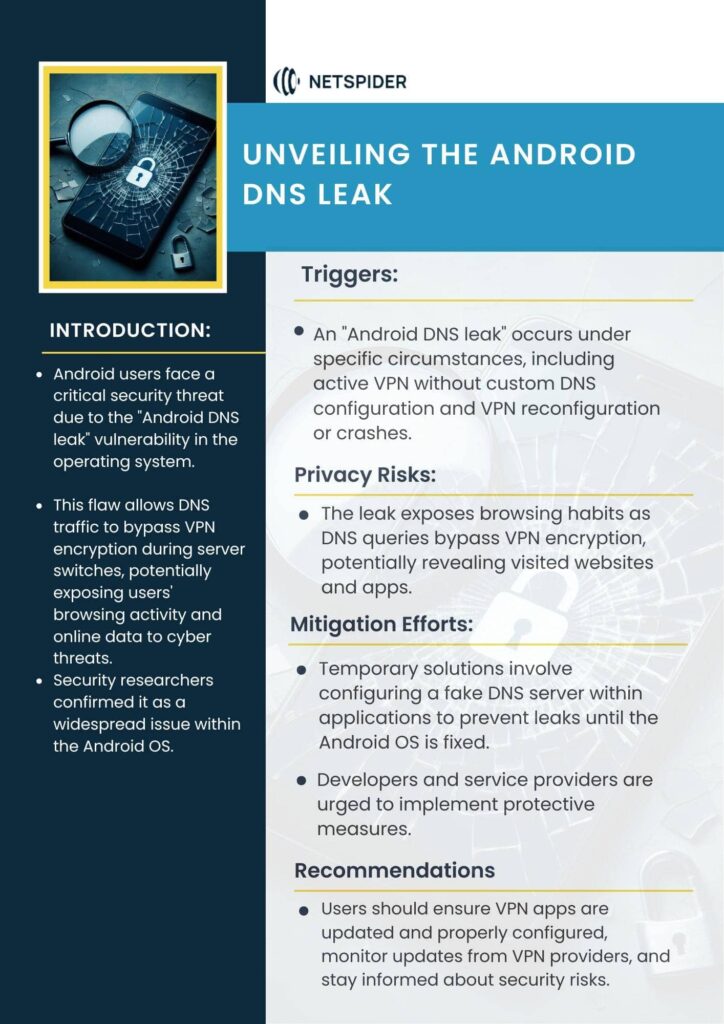Android users are exposed to a critical security threat due to a recently discovered vulnerability in the operating system. This flaw, known as an “Android DNS leak,” allows DNS traffic to bypass VPN encryption during server switches, potentially exposing users’ browsing activity and online data to cyber threats. The issue, affecting various Android versions, including the latest Android 14, was initially reported on Reddit and highlights the urgent need for users to take action to protect their privacy.
Android DNS Leak Discovery:
An observant user on Reddit first uncovered the “Android DNS leak” vulnerability. They noticed DNS queries leaking when toggling their VPN connection on and off, even with the “Block connections without VPN” setting enabled. Further investigation by security researchers confirmed this wasn’t an isolated case but rather a widespread issue within the Android operating system.
Understanding the Android DNS Leak Triggers:
An “Android DNS leak” can occur under specific circumstances:
- Active VPN Without Custom DNS: If you’re using a VPN but haven’t configured a custom DNS server within the VPN app itself, your DNS traffic might leak.
- VPN Reconfiguration or Crash Vulnerability: During brief moments when the VPN app reconfigures its tunnel or experiences a crash, an “Android DNS leak” can also happen.
These leaks are primarily associated with applications like Chrome browsers, which directly call the C function “getaddrinfo” to translate website names into IP addresses. This function can bypass the VPN’s encryption if a custom DNS server isn’t set within the VPN app, potentially exposing your DNS queries and browsing activity.
Privacy Risks of the Android DNS Leak:
An “Android DNS leak” exposes users to significant privacy risks as it can reveal their browsing habits. When a leak occurs, your DNS queries, which translate website names into IP addresses, bypass the VPN’s encryption. This means the websites you visit and potentially the apps you use can be exposed to third parties, defeating the purpose of security features like “Always-on VPN” and “Block connections without VPN.

DNS leakage mitigation:
In response to these findings, efforts are underway to implement a temporary solution by configuring a fake DNS server in the blocking state of the respective application. This measure aims to prevent DNS leaks until a permanent resolution is introduced in the Android OS. Furthermore, developers and service providers are urged to assess their applications and deploy comparable protective measures if deemed necessary.
Key Recommendations for Android Users:
To safeguard against the Android DNS leak vulnerability, users are urged to:
- Verify that their VPN apps are current and properly configured.
- Stay vigilant for updates from their VPN service providers addressing this concern.
- Stay informed about potential security risks and strategies to address them effectively.
Response from Google:
While Google has not yet responded to the discovery, the community expects updates to the Android OS in light of this issue. There is anticipation for a resolution to prevent potential privacy breaches in the future.

Conclusion:
Identifying the Android DNS leak underscores the critical importance of maintaining continuous vigilance and taking prompt action in digital security. It reminds users to remain cautious and proactive in safeguarding their online privacy and security.
Source: cybersecuritynews.com
